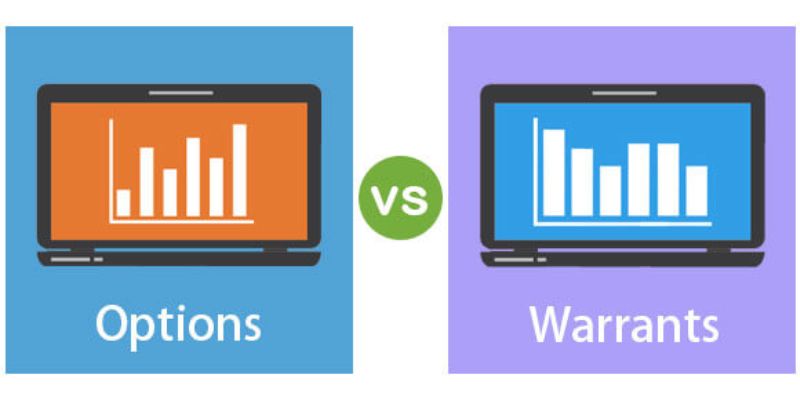Having an understanding of warrants and call options can help you make better decisions when it comes to investing in stocks and commodities. If you want to take more control over your investments, learning the ins and outs of these two financial securities is a must.
In this blog post, we will explain the basics of both warrants and call options, highlighting their similarities and differences so that you can comprehend the nuances between them, allowing you to use them effectively for your benefit.
What are Warrants and Call Options, and how do they Work
Warrants and call options are financial securities that enable you to gain exposure to a stock or commodity without owning it. Warrants are derivatives, meaning they derive their value from an underlying asset, while call options are contracts that give the buyer the right (but not obligation) to purchase an asset at a predetermined price on or before a specific date in the future.
Both warrants and call options give the buyer leverage over their investment, meaning they can potentially yield greater returns than if one had purchased shares directly. This is because these instruments allow buyers to invest a smaller amount of money upfront for the right to buy larger amounts later, thus magnifying profits when prices increase.
For example, if one purchases a call option for $100 that gives them the right to purchase 100 shares of XYZ Corp at $50 per share, one could pocket a larger profit if XYZ's stock price rises past $50.
Warrants and Call Options Similarities
Warrants and call options share many similarities. Firstly, both instruments allow buyers to purchase an underlying asset at a predetermined price in the future. Additionally, both instruments provide leverage, enabling investors to buy more of a stock or commodity with less money upfront than would be necessary if they had purchased shares directly. Furthermore, both warrants and call options can be used for hedging purposes, using one to offset potential losses from another security held by the investor.
Lastly, warrants and call options have similar expiration dates. Warrants usually expire after several years, while call options expire within months or weeks of their issue date. Regardless of your chosen instrument, you must ensure you don’t get stuck holding an expiring security that can no longer be sold or traded.
The Difference in Warrants and Calls
Despite these similarities, warrants and call options remain distinct in certain ways. Warrants typically give the holder more time to exercise their rights than a call option, often several years. Additionally, warrants have higher strike prices than calls, meaning buyers would need to pay more upfront for the same underlying asset if they opt for a warrant over a call option.
Issuer
The company issues warrants, while call options are typically issued through a broker or other financial intermediary. A warrant issuer is usually the company whose stock or commodity the investor wants to buy. On the other hand, call option issuers typically obtain options from large financial institutions that own shares of the underlying asset and are willing to sell them at discounted rates.
The issuer plays an important role in warrants and calls because they can affect the pricing and availability of these instruments. Companies may issue warrants if they want to raise capital or gain exposure to certain markets, while brokers can offer call options with better terms than those provided by the company.
2. Price
Warrants are cheaper than call options regarding upfront costs, making them attractive for investors with limited funds. Additionally, warrants are usually priced so that their strike price rises with the underlying asset's market value. This feature protects investors from losses and gives them more time to decide when to exercise their rights.
On the other hand, call options tend to be more expensive than warrants due to their shorter expiration dates and larger upfront cost. However, these instruments offer buyers better leverage than warrants since they can purchase many shares at a lower price than currently offered. Buyers who choose call options over warrants could earn higher profits if the stock or commodity prices increase significantly before the option expires.
3. Risk Management
Understanding warrants and call options can be a great tool for investing and risk management. Warrants may provide investors with greater protection against losses since they are cheaper than calls and have longer expiration dates. Additionally, these securities enable buyers to participate in an asset's appreciation without tying up large amounts of capital upfront.
On the other hand, call options may help investors profit from short-term market movements due to their shorter expiration dates. These instruments also allow buyers to purchase more shares of a stock or commodity than they could afford if they had bought shares directly. As such, both warrants and call options offer advantages that might help investors manage their risk exposure and maximize their return on investment.
Factor Influencing Valuation
Underlying Stock Price
The underlying stock price of the asset bought with either a warrant or call option is one of the main factors influencing their valuation. Since warrant and call options are derivatives, they derive their value from the underlying asset they give buyers rights to. Therefore, when an asset's stock price rises or falls, so does the value of warrants and calls issued on it.
Time Value
Time value also plays a role in determining the worth of warrants and calls. Warrants usually have longer expiration dates than calls, meaning buyers have more time to exercise them for profits before they expire. As time passes, warrants may become more valuable if the security's market price remains steady or value increases. Conversely, call options may become less valuable with each passing day as their expiration date approaches.
Volatility
The volatility of the traded security is also important when valuing warrants and calls. Generally speaking, higher volatility means more potential for profits and greater risk. Buyers can profit quickly when an asset's price fluctuates rapidly by exercising their rights to buy or sell shares. At the same time, buyers may face larger losses if prices drop drastically before exercising their rights.
FAQs
Q: What is a warrant?
A: A warrant is a type of security that gives its holder the right to purchase shares in the company at a predetermined price within a certain period. Warrants are typically issued directly by the company and have an expiration date. Warrants can be used as long-term investments or to hedge against potential losses on other positions in the stock market.
Q: What is a call option?
A: A call option is another type of financial security, but it differs from warrants in several ways. Unlike warrants, call options do not give you ownership rights in the company issuing them; rather, they allow you to purchase shares at a predetermined price within a specified time frame.
Q: How do you profit from a warrant?
A: Warrants can be very lucrative investments. If the underlying stock price rises above the warrant's strike price, you can purchase shares at a discount and potentially make a large profit. Conversely, if the stock falls below the strike price before expiration, you are not obligated to exercise your option and can avoid further losses.
Conclusion
Understanding the differences between warrants and call options is an important step toward successful investments. With a firm grasp of these two financial securities, you can use them to make informed decisions about investing in stocks and commodities.






